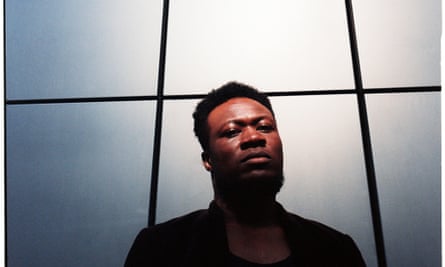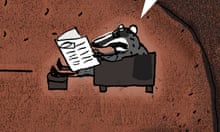“It started in winter 2013, that’s when I began to lose control of my body. Around Christmas, I got all of my jewellery together and I started giving it to people as they were shopping. One of my favourite watches was a rose gold Rolex, and I had that in my inside pocket. I remember somebody talking about ‘time’ and I just reached into my pocket and gave it to them. During that period, I cleared out my entire house, not knowing what I was doing. I lost everything within the space of about four months.”
Adegbenga Adejumo – Benga, for short – is speaking about the breakdown he experienced two years ago, which led to him being sectioned. An in-demand DJ, producer and member of dance supergroup Magnetic Man, with his Croydon cohorts Skream and Artwork, he announced that he was going into retirement last February to focus on his family. But the 28-year-old dubstep pioneer recently took to Twitter to reveal the real reason he had taken a break. In a series of messages, he opened up about his mental health problems, namely that he was bipolar, which was “brought on by drugs”, and had schizophrenia, “the result of excessive touring”.
“Part of me opening up and talking with people about mental health is a way of moving forward,” he says, explaining his decision to talk publicly about his illness. “It’s good to see people on my Twitter feed talking about it.” Benga’s willingness to speak out is rare among the dance music community. Mental health problems are often ignored, anathema to its ethos of hedonistic escapism or commercial success. “This industry is all about perception: a lot of people wouldn’t want anybody to think they’re weak, or that they can’t do what they do, or that they’re not cool,” says Benga. “Nobody wants to come clean, let alone an artist.”
Neither are the risks of recreational drug use very visible within the club scene. According to 2012 government figures, 37.7% of adults aged 16 to 24 in England have used drugs, while another 2014/15 report found that ecstasy use among the same age group in England and Wales had increased by 95,000 people on the previous year. But among some revellers, that use is regular and heavy. “We have a [party] culture where it’s not about having fun, it’s about outdoing your mates and going on unnecessary benders,” continues Benga. “If I’d heard of more cases it would’ve made me think more about what I was consuming.”
Drugs are just one of many potential causes for mental health disorders such as schizophrenia, but Benga links the beginning of his illness to his own substance use. “I’d been taking them since I was 17 years old, but it really started to affect me when I was about 22, 23. The majority was ecstasy but I also discovered ketamine when I was 25. I started to get anxiety and paranoia, but it’s always been in my nature to carry on and think that everything is going to go away.” A hectic touring schedule, coupled with the pressure to be the life and soul of every party, caused yet more anxiety. “I found myself getting high because of it – I’d be in a situation and I’d be anxious, so I’d think: ‘Let’s get out of it.’ People would say to me: ‘You need to slow down,’ but I didn’t recognise that anything was wrong.”

His actions confused family and friends who, says Benga, “must have felt helpless”, or else hoped it would blow over when his mania became more extreme. It took being arrested in March 2014 for him to come to the realisation that he needed help. “I don’t want to scare people but it was an extreme situation and I’d become aggressive,” he explains. “I was seen by a doctor and he decided that I should stay in the intensive unit. It took a while for reality to settle in but the more I spoke about my breakdown, the more I realised that it was common.” Ultimately, he says, being sectioned was the right decision. “There’s a lot of stigma around sectioning, as if it’s something you couldn’t possibly do to another person. A lot of people are scared. But it needs to be done.”
He describes the period following hospital as “very depressive”. “Being ill meant that I had to address how I feel. I had an ego check,” he says. He still has highs and lows but he was prescribed the antipsychotic drug aripiprazole, which he takes whenever “I feel myself not being able to control my thoughts”. What helped him get through above all, he says, was a focus on making new material. “I listened to a record I made with [his Magnetic Man bandmate] Artwork called Shut It Down, which is very futuristic and funk-sounding, and my illness became inextricably linked to it. I knew that I had to create this thing I called future funk – that was the only thing I could hold on to. Maybe it’s crazy music and everyone will go: ‘Yeah, he was ill when he made this,’ [laughs] or maybe people will be into it. But if I hadn’t have had that, I could see myself drowning.”
A return to DJing is a slow and gentle process, however – a set at Bestival last month was his first in well over a year. “I know I’m going to battle with this my whole life. I know I can’t touch drugs and I can’t be stupid,” he says. His illness has changed his perspective on his career for the better. “There are points now where I think to myself that I’m the happiest I’ve ever been. Before having this illness I didn’t have that much focus: my ego was getting the better of me and I wasn’t sure of how I felt. I was a robot. Now this illness has kind of given me focus: it’s made me realise what’s most important to me and to get my priorities straight.”
Benga hopes that speaking out will help break the stigma around mental health problems, which affect one in six British adults at any given time. “I never thought it would happen to me,” he says. “As a kid, I remember there was one lady in Coulsdon who used to walk around with a doll, and that’s what I used to think when I thought about mental health. We think of mental patients in films; we need to see people like myself. People need to see that I can function and I’m not manic now, and that this can happen to anyone.”
He also thinks that it will help people recognise the symptoms more quickly in others. “I would plead with anybody who sees anything wrong with their mates, their family members, to act on it straight away,” he says. “That way you can limit the damage that’s done. Too many people are blase. I see it in other people now more than ever. I see the mood swings and the paranoia and I think to myself: ‘You’re on a bad road.’ I can see it in some A-list celebrities, and I think: ‘Who’s around them, who’s going to help them take that step to sort it out?’”
- Mind.org.uk and sane.org.uk provide emotional support and information to anyone affected by mental illness








Comments (…)
Sign in or create your Guardian account to join the discussion